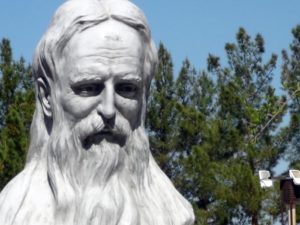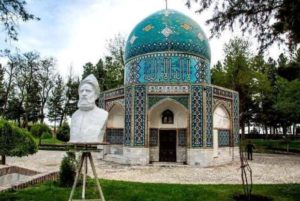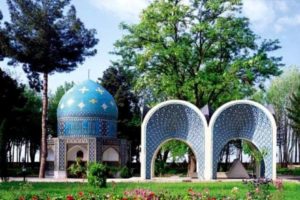April 14, (Farvardin 25) commemorates Attar of Nishapur, Persian Muslim, poet, theoretician of Sufism, and hagiographer.

According to an ISCA report, the great 13th century Sufi poet Farid al-Din Attar is renowned as an author of superb short lyrics written in the Persian language. He is mentioned by only two of his contemporaries, `Awfi and Tusi. However, all sources confirm that he was from Nishapur, a major city of medieval Khorasan (now located in the northeast of Iran), and according to `Awfi, he was a poet of the Seljuq period.
Attar of Nishapur was not well known as a poet in his own lifetime, except at his home town, and his greatness as a mystic, a poet, and a master of narrative was not discovered until the 15th century.
Attar is one of the most famous mystic poets of Iran. His works were the inspiration of Rumi and many other mystic poets. `Attar, along with Sanai were two of the greatest influences on Rumi in his Sufi views. Rumi has mentioned both of them with the highest esteem several times in his poetry: “Attar was the spirit, Sanai his eyes twain, And in time thereafter, came we in their train,” and elsewhere, “Attar has roamed through the seven cities of love while we have barely turned down the first street.”

Attar passed away in April 1221, when he was well over 70. His mausoleum is located in Nishapur. It was built by Ali-Shir Nava’i in the 16th century. Like many aspects of his life, his death, too, is blended with legends and speculation.
About thirty works by Attar survive, but his masterpiece is the Mantic at-Tayr (The Conference of the Birds). In this collection, he describes a group of birds (individual human souls) under the leadership of a hoopoe (spiritual master) who determine to search for the legendary Simurgh bird (God). The birds must confront their own individual limitations and fears while journeying through seven valleys before they ultimately find the Simurgh and complete their quest. The 30 birds who ultimately complete the quest discover that they themselves are the Simurgh they sought, playing on a pun in Persian (si and murgh can translate as 30 birds) while giving us an esoteric teaching on the presence of the Divine within us.



Leave a Reply